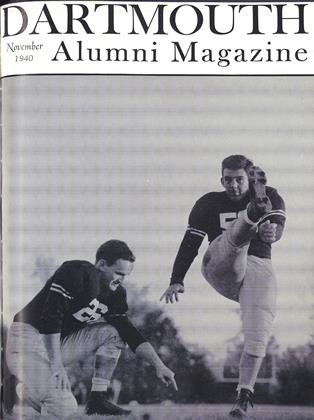Following the appointment of theAmerican Defense Dartmouth Group, thechairman, Prof. Harold J. Tobin '17, askedPresident Hopkins if he had any suggestions to give to the defense committee ofthe College in order to clarify the scope ofof the committee's work, its responsibilities, and its degree of autonomy. The following reply is quoted in full:
Dear Mr. Tobin:
In response to your inquiry as to whether I had counsel or advice which I wished to give to the Defense Committee, the answer is positively "No." My conception of the Committee is that it is established and should exist as an independent sovereignty and that it should operate as seems most intelligent and most desirable for full protection of Dartmouth's status as a liberal college. I have endeavored to indicate that it should operate quite apart from the administration or from the Board of Trustees. It, of course, as constituted, could not become an agency for faculty witch-hunting or an academic F.8.1. It should be a self-governing and self-directing agency for making democracy a colorful and a positive thing rather than a pallid and dilettante pose.
I believe that every possible protection should be given to preserve our status as a free people in order that democracy may indicate its capability to keep the spirit of liberty alive in war or peace. However, I believe as Dorothy Thompson said yesterday of England that a nation belongs to the people who will die to save it.
There appears to be a belief in some quarters that it is undemocratic for a people to delegate authority for a time which abrogates individual liberties, even at a time when unity of action is necessary to preserve democracy against such forces as can strike quickly with complete consolidation of all their resources. However, we delegated to the Government such authorities ourselves in the World War. As a matter of fact, in Secretary Baker's behalf I exercised some of these, but there was no slightest inclination on the part of the Government to continue the condition after the War was over. Moreover, circumstances were the same then in England, while today, as far as laws are concerned, every vestige of personal liberty has been sacrificed to government control if the government finds it necessary to appropriate this to save England.
As far as my personal opinion goes, the thing that I should like to see accomplished here at Dartmouth is to make articulate willingness to assume the responsibilities of liberty rather than emphasizing so exclusively our claims to its rights and privileges. Was it not Professor James who said that "freedom from" was without point until it was transmuted into "freedom for" creative and constructive action.
For some reason, even above other colleges of our kind, we have acquired a reputation in the outside world of influencing our men to cynicism, pessimism and an unbelief in the existence of merit or virtue anywhere. I should like to see cultivated here a confidence and faith in democracy that would believe it so indispensable as to be justified in preserving itself—and capable of doing so—that its vitality and its creative impulses might be transmitted to others even as forceful and self-sacrificing men have transmitted them to us.
Yours very truly,
September 28, 1940.
 View Full Issue
View Full Issue
More From This Issue
-
 Article
ArticleCharles A. Proctor
November 1940 By JOHN HURD JR. '21 -
 Article
ArticleCan I Get In?
November 1940 By COREY FORD -
 Class Notes
Class Notes1926*
November 1940 By CHARLES S. BISHOP, CLARENCE G. MCDAVITT JR. -
 Class Notes
Class Notes1918*
November 1940 By ERNEST H. EARLEY, DONALD L. BARR -
 Class Notes
Class Notes1931*
November 1940 By CHARLES S. MCALLISTER, CRAIG THORN JR. -
 Class Notes
Class Notes1921*
November 1940 By CHARLES A. STICKNEY JR., ROGER C. WILDE
Ernest M. Hopkins
-
 Lettter from the Editor
Lettter from the EditorREGARDING CLASS FUNDS
December, 1925 -
 Lettter from the Editor
Lettter from the EditorPresident Hopkins' Tribute
May 1937 -
 Article
ArticlePRESIDENT HOPKINS REPLIES
JANUARY 1929 By Ernest M. Hopkins -
 Article
ArticleMemorandum
November 1940 By Ernest M. Hopkins -
 Class Notes
Class NotesDartmouth Club of N. Y.
December 1942 By ERnest M. Hopkins, S. J. Flanigan '23, Secretary -
 Article
ArticlePresident Hopkins Replies To Gift
October 1941 By Sigurd S. Larmon, Ernest M. Hopkins







